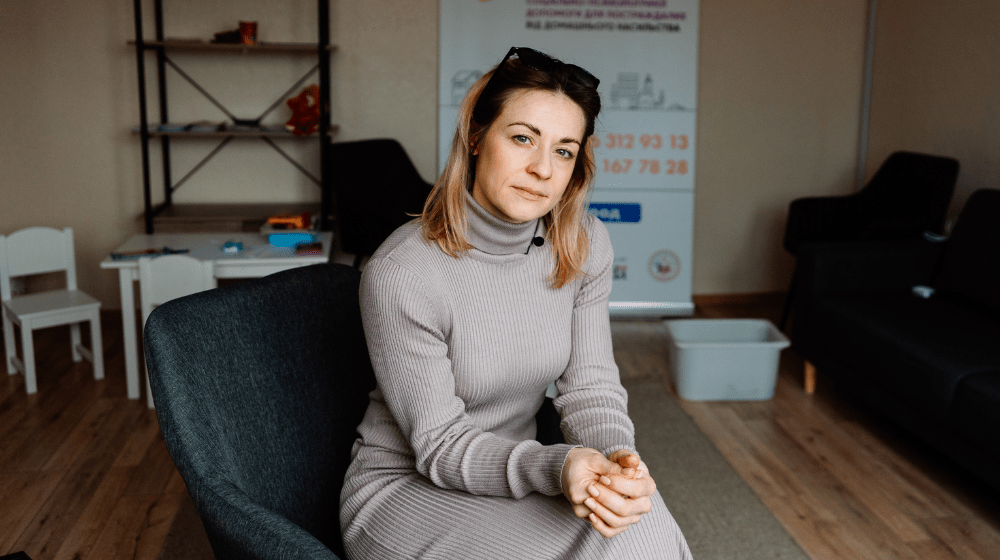Why do survivors of domestic violence hesitate to seek help? First and foremost, it is because of fear and banal shame to admit that they are being abused in their own family. This step is always the most difficult, but once a person decides to do it, he or she finally gets a chance to start life from scratch.
Employees of the Day Center for Social and Psychological Assistance and the crisis room help Uzhhorod residents with this. As well as UNFPA psychosocial support mobile teams, which have handled more than 300 calls in the first year of operation alone. How to break the cycle of domestic violence and who is ready to help is in our article.
Ivan Flenko
Director of the Center for Social Services of the Department of Social Policy of Uzhhorod City Council
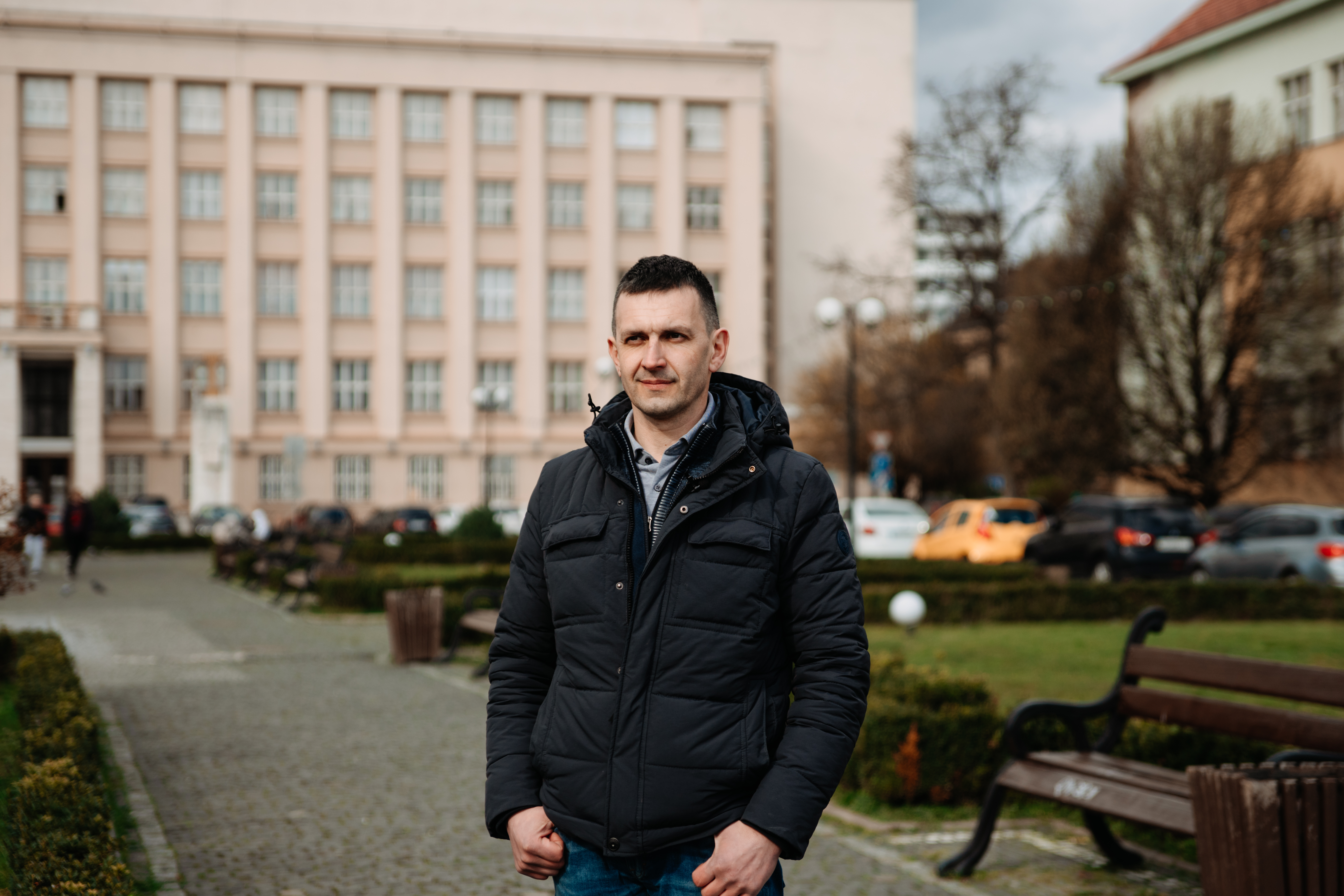
Crisis room is about safety
The crisis room is about safety. The safety of those who have suffered from domestic violence or gender-based violence. It is a space that the abuser will not know about and therefore will not be able to harm again. It is a space where the survivor receives any help they need. Finally, it is a shelter where the survivor is cared for by professionals.
Such a place where you can hide from violence and start your life from scratch has appeared in Uzhhorod. In April 2021, our city council took part in the UNFPA, the United Nations Population Fund's project "Cities and Communities Free of Domestic Violence".
The idea was not only to physically create a crisis room, but also to improve the work of social services, law enforcement agencies, healthcare, children's services, etc. In particular, to train professionals to identify cases of possible violence and, of course, to respond appropriately.
Sometimes survivors of violence are ashamed of their problems
During the existence of the crisis room, we have created a clear algorithm of actions for people who have suffered from domestic or gender-based violence. Survivors have several options for getting help. First of all, a person can simply call the police at 102.
However, there is a first obstacle here: survivors may be afraid or simply embarrassed to go to law enforcement. Therefore, there are alternative ways: a person can contact the Uzhhorod City Center for Social Services at 61-64-72, the Day Center for Social and Psychological Assistance at (067) 557-44-53, or an authorized person of the Department of Social Policy at 63-01-03.
These services know what to do and will quickly prepare a special referral to get the survivors to a safe place. However, it is important to understand that a person who is being persecuted, whose life is in danger, or who needs constant support due to their psycho-emotional state can end up in a crisis room. The Day Center for Social and Psychological Assistance to Survivors of Domestic Violence works with those cases of violence that do not require shelter.
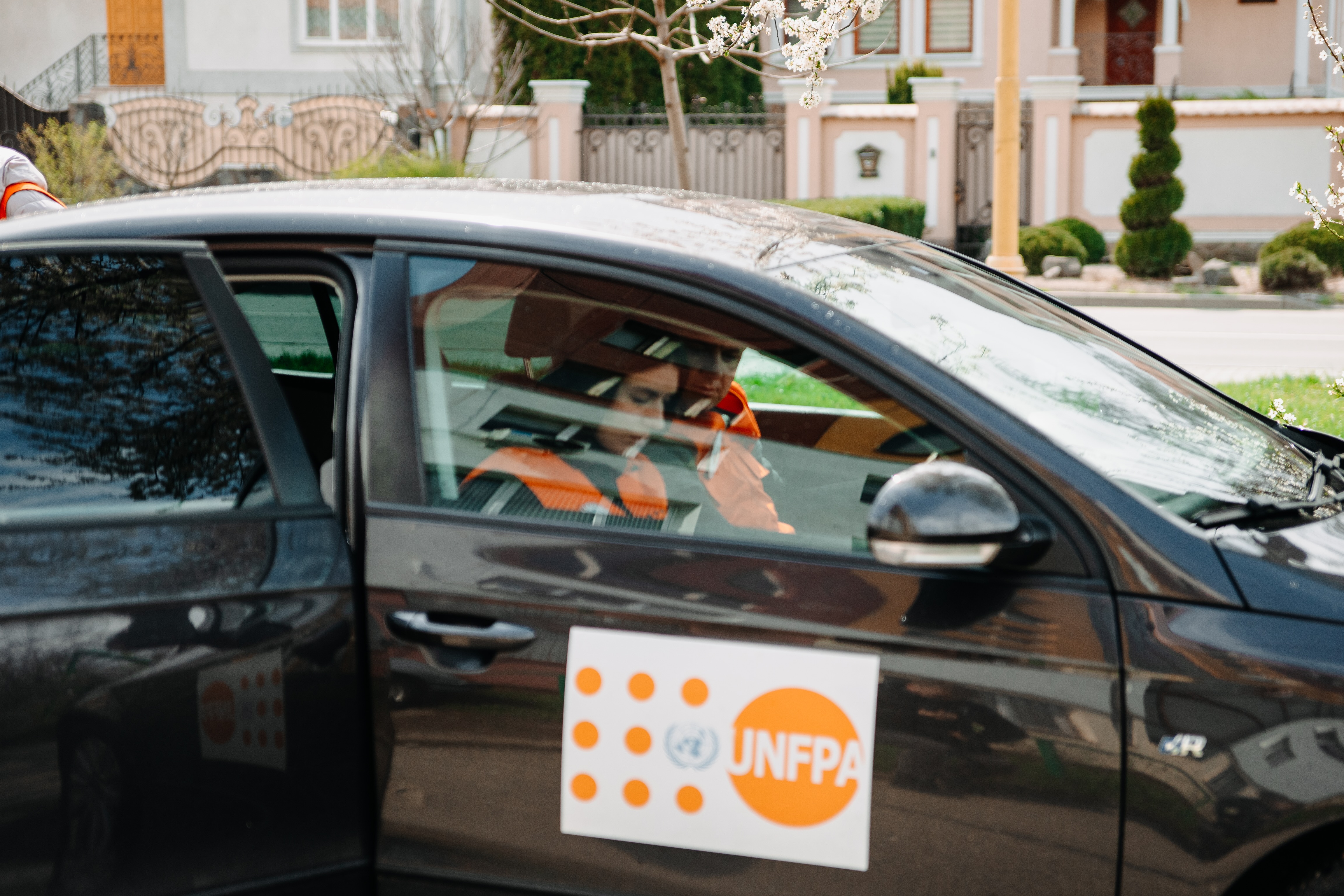
People have finally started to trust specialists
In addition, psychosocial support mobile teams work on the territory of Uzhhorod, as well as within 40 kilometers of the city. These are social workers who have cars at their disposal. Their task is quite clear: to respond as quickly as possible to cases of domestic violence. The team also includes a psychologist. This means that the team can handle any possible calls quickly and efficiently.
Specialists either promptly arrive at a person's home or a convenient place, or they can provide assistance in the office if the survivor feels more comfortable coming to the mobile team.
If you analyze the statistics of Uzhhorod, you can see how people have trusted our work. While the number of calls used to be minimal, in less than a year the mobile teams managed to reach more than three hundred people. And add to this the more than 150 cases processed by the Day Center for Social and Psychological Assistance. This does not mean that domestic violence has increased, but that people have begun to trust and seek help from specialists.
Each case is individual
To get to the crisis room, you need to contact social services, a mobile team or law enforcement agencies. This is a necessary measure. After all, we are talking about a classified place with a confidential address. Therefore, we must follow the rules to ensure that this space remains as safe as possible for everyone who needs our help.
In addition, we have organized round-the-clock video surveillance and the ability to call security for the peace of mind and safety of visitors to the crisis room. In case of danger, a response team will immediately arrive at the room and protect everyone there. However, fortunately, we have not had any such cases yet.
Each case is individual. As a rule, a survivor can stay in a crisis room for up to 10 days. However, there are exceptions when we can extend the time of a survivor's stay up to 20 days. This is currently the maximum period. If a person needs a longer shelter, specialists help to collect documents for settlement in a shelter. You can live in both institutions free of charge.
We do everything we can to make people feel less alone
During this time, social workers and psychologists work with the person, providing comprehensive assistance. Practice shows that this time is enough to resolve the crisis situation and help the survivor find immediate solutions.
However, this does not mean that once a person leaves the crisis room, they are left without help. Specialists continue to take care of them and provide support in all issues that the survivor faces.
And it's not just about psychological help. We also take care of the legal component. We try to help wherever we can, so that people do not feel alone and know that they have someone to turn to.
In cooperation with the local center for free secondary legal aid, a survivor can receive free legal advice and the opportunity to work with a lawyer who will help protect the rights of the survivor.
This means that a survivor will no longer stay in a crisis room, but will still receive services at the Day Center for Social and Psychological Assistance.
The main thing is that as many people as possible who have experienced violence should know that they have a place to turn to and where to get support from specialists. In December, there were also some changes related to the full-scale Russian invasion. Now Ukrainians who have suffered sexual violence by the Russian invaders can also receive help.
Iryna
client of the Day Center for Social and Psychological Assistance to Survivors of Domestic Violence
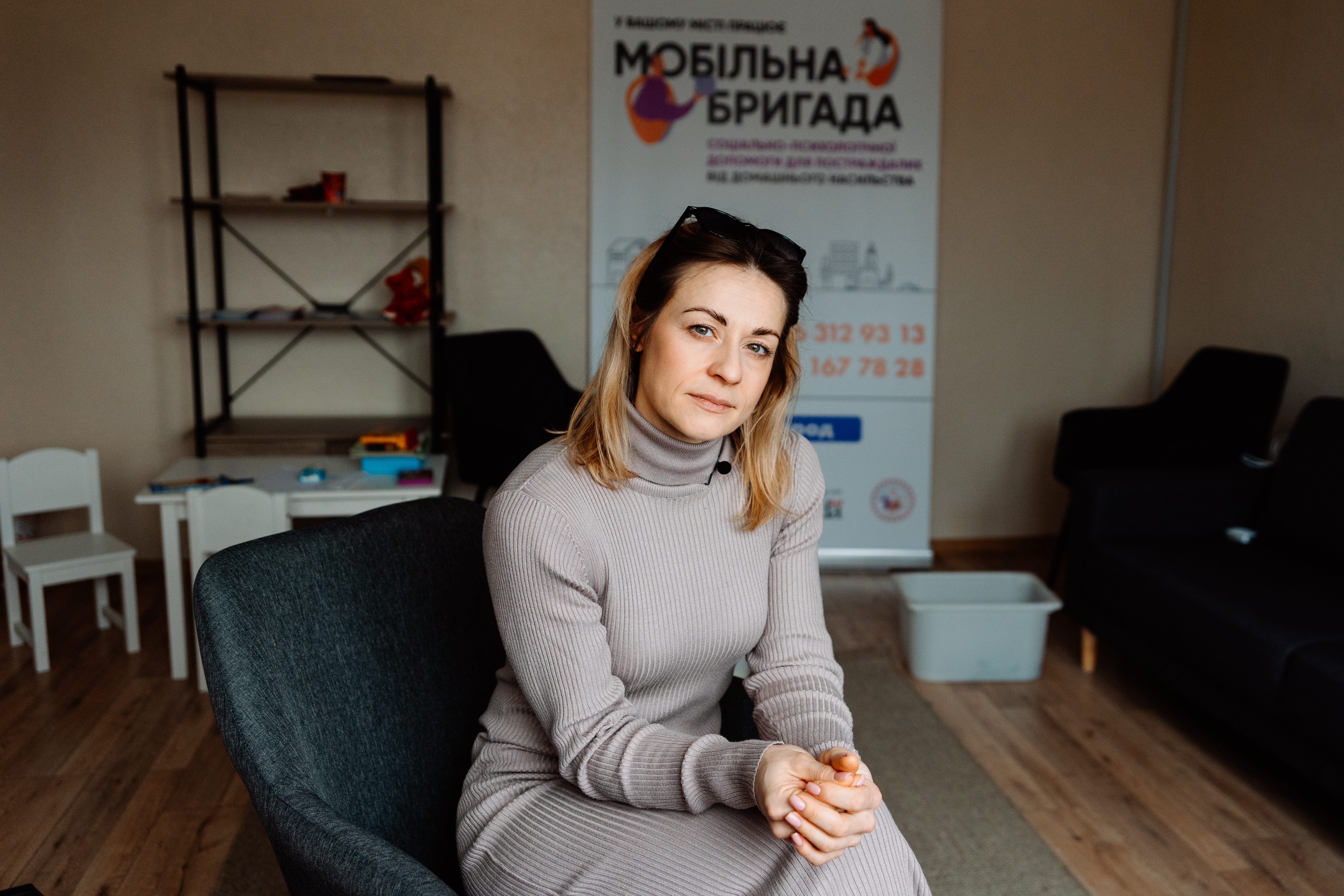
Time to file for divorce
I am from Luhansk region, but eight years ago I had to leave my hometown. So when the full-scale invasion began, our family decided to move to the west of Ukraine. At that time, my husband and I already had a 9-month-old daughter. Among all the cities, we chose Uzhhorod and decided to stay here. And eventually we had a son.
However, over the past three years, my relationship with my husband has deteriorated. So much so that I experienced domestic violence for the first time. And when I couldn't stand it anymore, I decided it was time to file for divorce. After all, such situations in our family only increased.
With the outbreak of a full-scale war, my husband's aggression only increased, so a mobile team came to visit me quite often. It was from them that I learned about the possibility of applying to the Day Center for Social and Psychological Assistance to Survivors of Domestic Violence.
I am not left alone with my problems
The specialists of the mobile team suggested that I contact the center for psychological support. And I followed their advice. Now I come to classes every week and take my children with me. Unfortunately, they have witnessed domestic violence in the family.
I can already say that I have experienced some positive moments from psychotherapy. Of course, there is still a lot of work ahead. But I am grateful that I am supported and helped to cope with everything I have been through.
It is also important that the Day Center staff is in touch with me around the clock. That is, they do not leave me alone with my problems, but always, let's say, keep their finger on the pulse.
Everyone here does their best, and it should be the same everywhere
I can say that Ukraine still has a lot of work to do to overcome domestic violence. After all, there are many factors that are far from ideal, and therefore need to be improved. However, here at the Day Center, everyone is doing their best. In the end, I think it should be so.
The fight against domestic violence in Ukraine three years ago and now are two completely different things. I hope this progress will continue.
Olha Pryntsovska
psychologist at the Day Center for Social and Psychological Assistance to Survivors of Domestic Violence
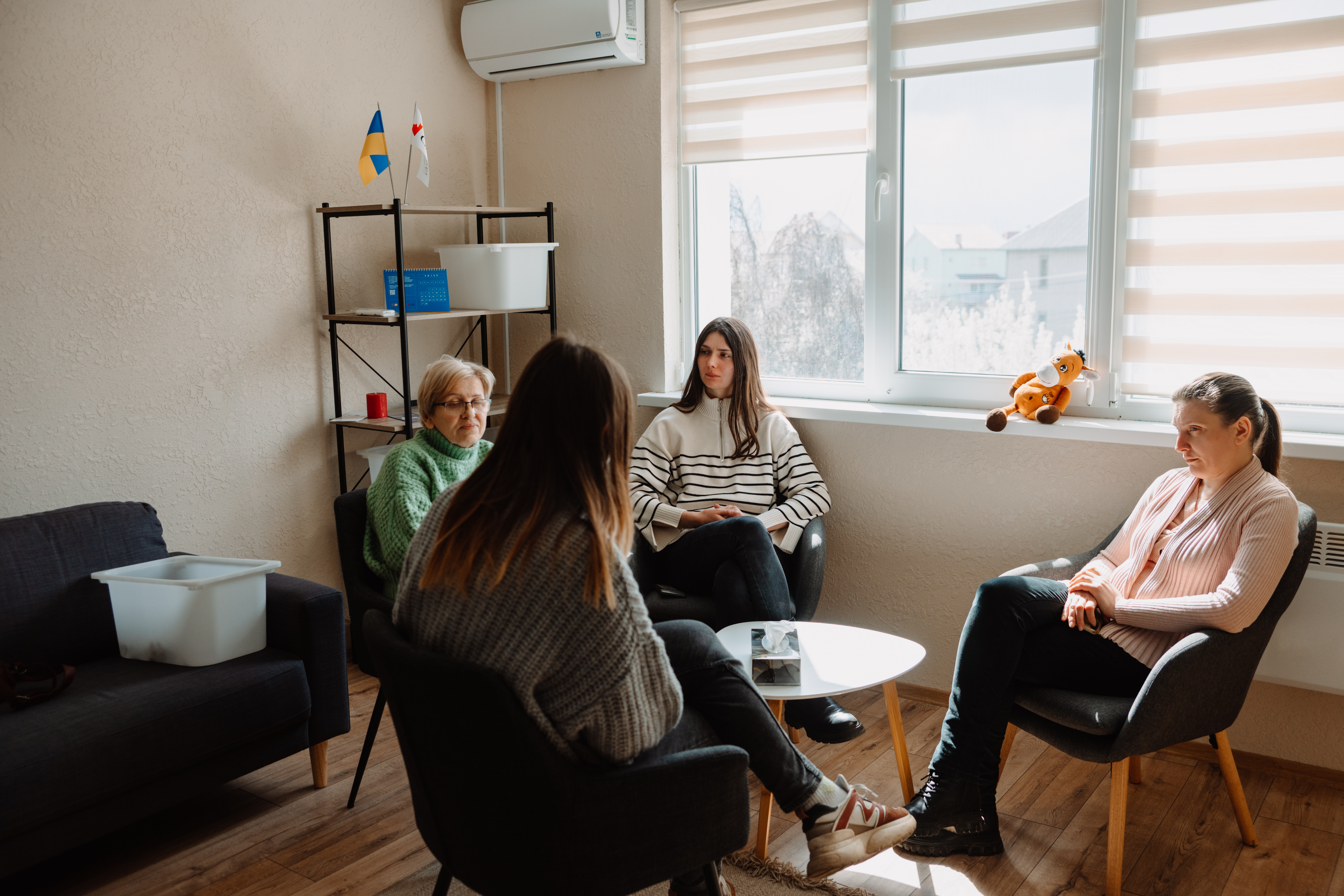
Along with physical violence, psychological violence always comes along
I spent many years working as a practical psychologist in a kindergarten and a city gymnasium. I worked with children and their parents for a long time. Working at the Day Center was a completely new experience for me. It is challenging and sometimes fundamentally different from anything I have worked with before.
First of all, it is about the level of confidentiality. It is of utmost importance here. After all, the lion's share of survivors who are in the Day Center or crisis room got here because of physical violence. And it never happens "on its own".
Psychological violence always comes along with physical violence, as well as economic violence. At our Day Center, we treat survivors with special care and trepidation.
"I endured, and you endure"
Most of my clients are women with children. A woman suffers psychologically, physically and economically. It is quite a common practice in our society when a wife gives birth to a child, goes on maternity leave, and the husband provides for the family. In this case, it is more difficult for a woman to escape from an abuser. First of all, because of dependence and fear of leaving herself and the child without financial support and a roof over her head.
Another common situation is when a survivor says: "My mom said: I endured, so you endure. Everything will be fine, and everyone lives like that." Such instructions only take away a woman's confidence that she can leave a person who harms or threatens her life.
And then there is shame. It is difficult for survivors to recognize and admit that they are being abused in their own family. A person may simply not be ready for such a confession. There are many similar factors. There may be many dependencies in the family that prevent them from breaking the cycle of violence.
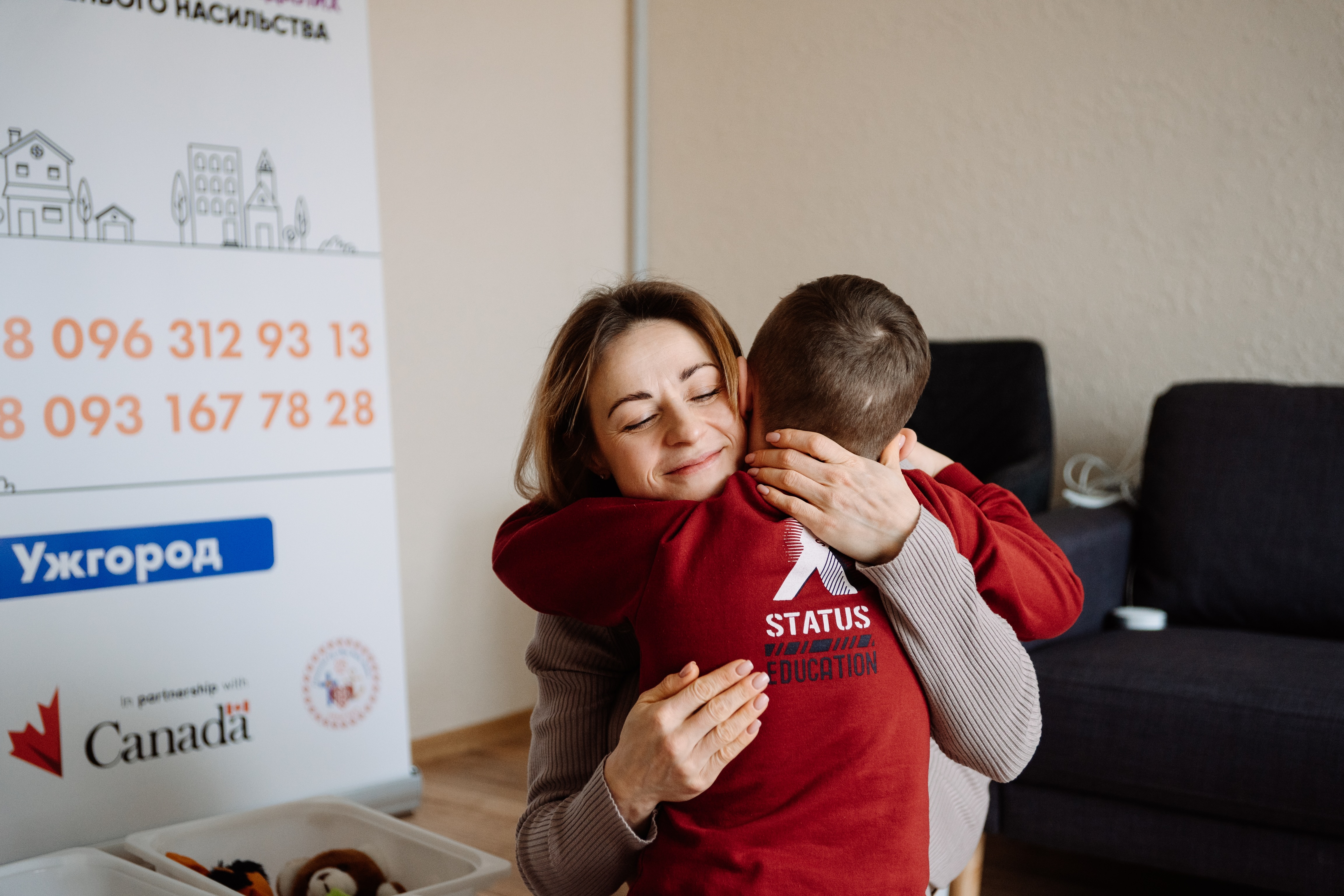
Anyone can help break out of the cycle of violence
I am convinced that one of the most effective ways to combat domestic violence is to popularize psychological assistance, develop similar centers for social and psychological assistance, and create crisis rooms for people who have suffered from domestic violence.
In Ukraine, it is often not customary to "meddle in someone else's family." Suffice it to recall how many Ukrainian sayings there are on this topic. This leads to the logical conclusion that outsiders are unlikely to inquire about what is happening in the family, let alone try to intervene.
But it is still possible to notice domestic violence. In particular, by changes in the behavior of children in kindergarten or the victimized woman at work. And it is also possible to try to influence it somehow.
For example, a neighbor who constantly hears manifestations of domestic violence can simply call the police. Law enforcement officers know what to do in such cases and can tell you how and where to go. You can also try to inform the survivor yourself about psychological assistance centers, crisis rooms, and mobile teams. And then, perhaps not today or tomorrow, but the survivor will take the first step.
Text and photos prepared by ShoTam.
In 2021, the city became a partner of the "Cities and Communities Free From Domestic Violence". The project is supported by the governments of the United Kingdom and Canada.

